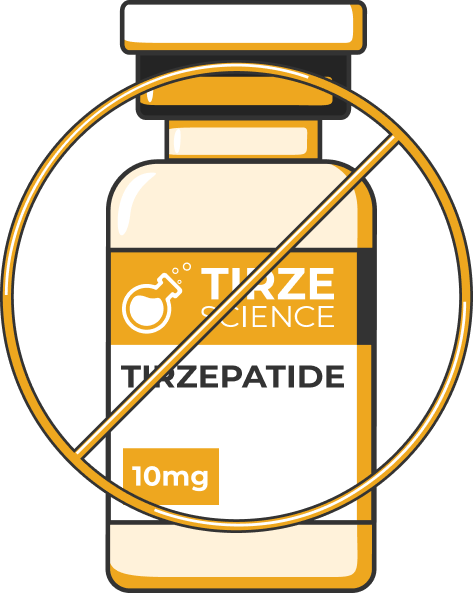- Home
Does Tirzepatide Work for Weight Loss and Obesity?

Does Tirzepatide Work for Weight Loss?

Does Tirzepatide Work for Weight Loss?
Tirzepatide, a medication originally developed for type 2 diabetes management, has shown promising results in weight loss. Clinical trials have documented significant weight reduction in participants, making it a potential game-changer for those struggling with obesity.
Patients in clinical trials experienced a notable weight reduction, with some losing up to 20% of their body weight. This level of effectiveness places Tirzepatide among the most potent weight-loss medications available today. However, it's important to note that, like any medication, Tirzepatide may have side effects. Common ones include gastrointestinal issues such as nausea, diarrhea, and constipation, though these typically lessen over time.
While this drug shows significant promise, it should be considered a part of a comprehensive weight management plan that includes diet, exercise, and lifestyle changes. Healthcare providers often emphasize the importance of adopting healthy habits to complement the medication's effects and ensure sustainable weight loss.
How Effective is Tirzepatide for Weight Loss?
How Effective is Tirzepatide for Weight Loss?
This medication shows a lot of promise in helping people lose weight. It works like a natural hormone that controls hunger and helps our body handle sugar. This means it can help reduce how much you feel like eating and improve your body's sugar levels, which together can lead to weight loss.
Studies have found that people taking Tirzepatide can lose a significant amount of weight. On average, someone might lose about 15% to 20% of their body weight. This is a big deal because Tirzepatide can be more effective than other weight loss medications.
However, it's not just a magic pill. To see the best results, eating healthily and exercising regularly is important. Think of Tirzepatide as a helpful tool in your weight loss journey, not the entire solution.

For obese individuals, the benefits of losing weight go beyond appearances. It can mean improvements in blood pressure and cholesterol levels and a lower risk of diabetes. Tirzepatide contributes to these health improvements by helping to manage the body's insulin levels and reducing appetite, which naturally leads to eating less.
Tirzepatide for Weight Loss for Diabetics
For diabetics, managing weight can be a crucial part of controlling their condition, and Tirzepatide offers a dual benefit in this regard.
The way Tirzepatide works is quite innovative. It targets and mimics certain hormones naturally produced by the body, which help regulate hunger and how the body uses insulin. For someone with diabetes, this means not only could their blood sugar levels become more stable, but they might also feel less hungry, leading to a natural reduction in calorie intake and weight loss.
Clinical studies have backed up the effectiveness of Tirzepatide in helping diabetics shed pounds. Participants in these studies have seen significant weight loss, which is particularly encouraging because losing weight can sometimes be more challenging for people with diabetes due to factors like insulin resistance.
Tirzepatide for Weight Loss in Non Diabetics
For non-diabetics struggling with weight management, Tirzepatide offers a new approach. It helps curb appetite and makes you feel full longer, naturally leading to decreased calorie intake and weight loss. The results from research are promising, showing significant weight reduction in individuals who do not have diabetes.
One of the key points about Tirzepatide is its potential to improve overall health beyond just shedding pounds. Weight loss is closely linked to better heart health, lower risk of certain diseases, and improved energy levels.
Using Tirzepatide for weight loss involves several key steps to ensure it's used safely and effectively.
Consult With Your Doctor: Before starting Tirzepatide, talking to a healthcare provider is essential. They can assess if it's the right medication for your specific situation based on your health history and weight loss goals.
Understand Your Dosage: Once prescribed, make sure you're clear on the dosage instructions provided by your doctor. Tirzepatide dosing is tailored to individual needs, starting with a lower dose that gradually increases over time to reduce side effects and improve tolerability.
Learn Proper Injection Technique: Tirzepatide is administered through an injection. Your healthcare provider will show you how to inject the medication correctly. This might include instructions on where to inject (such as your abdomen, thigh, or upper arm), how to rotate injection sites, and how to store the medication.
Incorporate Healthy Habits: Achieving the best results with Tirzepatide also means adopting a healthy lifestyle. Focus on a balanced diet, regular physical activity, and adequate sleep. These habits support the effectiveness of the medication in promoting weight loss.
Monitor Your Progress and Side Effects: Keep track of your weight loss journey, including any side effects you may experience. Common side effects include nausea, diarrhea, and reduced appetite, which often improve as your body adjusts to the medication.
Regular Check-Ins With Your Healthcare Provider: Schedule follow-up appointments with your doctor to monitor your progress, adjust the treatment plan if necessary, and address any concerns or side effects you're experiencing.
Stay Patient and Committed: Weight loss with Tirzepatide is a gradual process. It's important to stay patient and committed to your treatment plan, even if results take time to become noticeable.
Are There Side Effects?

Are There Side Effects?
Yes, like most medications, Tirzepatide can have side effects. It's important to be aware of them so you can manage them effectively and discuss any concerns with your doctor.
- Nausea and Vomiting: Some people might feel queasy or even throw up, especially when they first start taking Tirzepatide.
- Diarrhea: Experiencing loose or frequent bowel movements is another common side effect.
- Reduced Appetite: You might find that you're not as hungry as usual, which is part of how the medication helps with weight loss.
- Stomach Pain: Some individuals may experience discomfort or pain in the stomach area.
- Constipation: Difficulty with bowel movements can occur but usually improves over time.
- Fatigue: Feeling unusually tired or weak is possible when taking this medication.
Who Should Not Use Tirzepatide for Weight Loss?
Who Should Not Use Tirzepatide for Weight Loss?
While Tirzepatide is a helpful weight loss medication for many, it's not suitable for everyone. Here are some key groups of people who should avoid using Tirzepatide for weight loss.
Pregnant or Nursing Women: Women who are pregnant or breastfeeding should avoid using Tirzepatide. The effects on pregnancy and nursing babies are not fully understood, so it's safer to explore other weight management strategies during these periods.
People with a History of Pancreatitis: If you've had pancreatitis (inflammation of the pancreas) in the past, Tirzepatide may not be recommended due to potential risks of recurrence.
Individuals with Thyroid Cancer History or Family History: Those with a personal or family history of medullary thyroid carcinoma (a type of thyroid cancer) should steer clear of Tirzepatide. It's also advised against individuals with Multiple Endocrine Neoplasia syndrome type 2 (MEN 2).
Those with Severe Kidney or Liver Issues: If you have significant kidney or liver problems, Tirzepatide might not be the best choice due to potential safety concerns and the need for dose adjustments.
Individuals with Serious Allergic Reactions to Tirzepatide Ingredients: If you've had serious allergic reactions to any component of Tirzepatide, it's important to avoid this medication.
